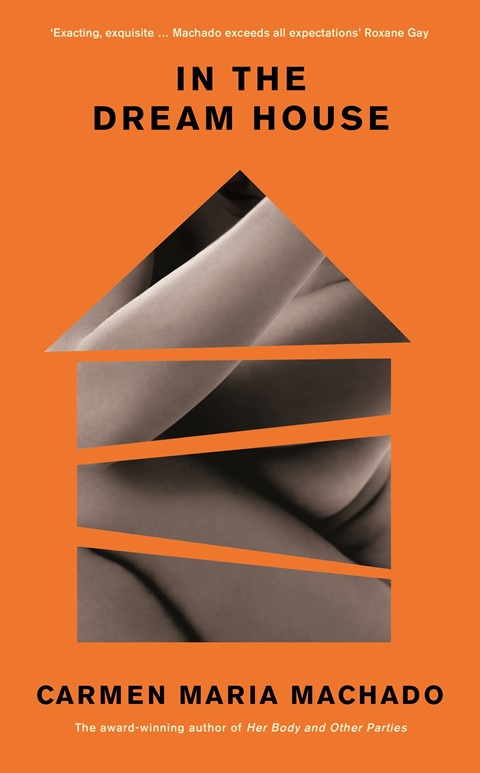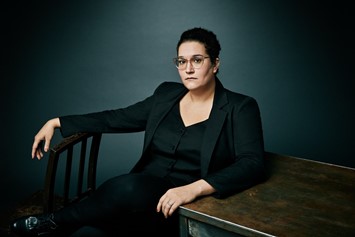The acclaimed author of Her Body and Other Parties, Carmen Maria Machado, speaks to Nick Levine about her searing new memoir, In the Dream House
Carmen Maria Machado has already made her mark as a writer of fiction: her horror-driven short story collection, Her Body and Other Parties, was a finalist for the prestigious US National Book Award and is being developed into a series by FX. Now, she’s written a haunting and incredibly important piece of nonfiction, In the Dream House: A Memoir, in which she recalls the abusive relationship she endured while studying at the prestigious Iowa Writers’ Workshop.
In the Dream House is notable because it documents abuse within a queer relationship, something our heteronormative society rarely confronts; it’s completely vital, too, because Machado writes with devastating honesty and creativity. She splits her story into genre-melding shreds of recollection – ‘Dream House as Famous Last Words’, ‘Dream House as Meet the Parents’, ‘Dream House as Cosmic Horror’, and so on – which combine to create something sad, scary and affecting. “If you need this book,” she writes at the start, “it is for you”.
With the book now available in the UK, I called Machado at her Philadelphia home to find out how she approached writing such a powerful and pain-filled memoir.

Nick Levine: What made you want to share this story with the world now?
Carmen Maria Machado: That’s a good question. I tried to write it for years and it was always really terrible because I just wasn’t ready. And I don’t even think necessarily that now, having finished it, I was ready. But I was certainly the right kind of artist that I needed to be in the moment to write this book. It was something I had to get out of my system, so I felt a certain pressure to get there. And I think deciding that was kind of like taking my own temperature, reading my own room, trying to figure out if I was in the right place or not. And I mean, I did it, so I must have been in some kind of right place! Right?
NL: How long did you spend writing it?
CMM: I did it in such weird little fits and bursts that it’s hard to say. I had written a draft that I sold to [publishers] Graywolf a couple years ago and I wrote that in little pieces in between finishing my first book. And then the second burst was for about six months last year. So it’s taken me, let’s say, two years of effort. I feel like that’s a reasonable estimate.
NL: Did revisiting these incredibly painful episodes from your life take a toll on you mentally?
CMM: Yeah, the six-month period last year was not great. I sort of did everything wrong in terms of my own mental health. Like, I was really pushing myself, I was far away from my house and my wife, and I was really in a bad place. I just felt lonely and very sad, and because I was away from home, I wasn’t in therapy. And it was really hard. I would be immersed in my own book but also all this research [around abusive relationships] and it was just so sad. I was like, ‘My God, I just can’t do this anymore’. But I had to push through; I just had to do it.
NL: Was part of this pressure you felt connected to the fact that we hear so little about abuse in queer relationships?
CMM: Yeah, that was something I looked for, but didn’t find a ton of. I was really struck by the lack of writing in this area and decided it was something I wanted to try and write about myself. There are a lot of memoirs about abuse, but I was like, ‘Why do we have so little about queer people who go through this experience?’ It really bothered me and that was definitely part of my motivation.
NL: Why do you think we read so little about queer people who experience this kind of abuse?
CMM: I think for a few reasons. Historically, we’ve sort of buried queer stories – we as a culture aren’t super interested in queer people’s stories, in the same way we’re not super interested in women’s stories. Queerness and abuse are both subjects that are typically thought of as shameful and not worth committing to the page or the archive. I think there’s also a pressure that queer people feel to kind of ‘perform virtue’. Because we’re constantly fighting for rights of various kinds, there’s this desire to be, like, ‘Look how good I am. Queer relationships are great – they’re just as great as straight relationships!’ So I think there’s a lot of pressure coming from all sides.
“There are a lot of memoirs about abuse, but I was like, ‘Why do we have so little about queer people who go through this experience?’ It really bothered me and that was definitely part of my motivation” – Carmen Maria Machado
NL: You confront this in the book when you write that if you could say anything to your ex, it would be: ‘For fuck’s sake, stop making us look bad.’
CMM: Sure, and I wrote the book thinking about [same-sex] marriage, because that was what was happening politically in the United States while I was having this experience [of abuse]. Also, it’s not as if we’ve solved homophobia, you know? And look at trans people – they’re fighting one of the biggest uphill battles in the world. What I say in the book is that the fact abuse can happen within queer relationships shouldn’t make a difference to the rights we deserve. We deserve human rights because we’re human beings. I think there’s a real struggle for any group which is fighting for the rights they deserve while also having to perform virtue for the dominant group in society. That kind of performative acceptability politics is bullshit, it’s super-bullshit.
NL: What’s the reaction to the book been like?
CMM: I mean, mostly positive. People have had some lovely things to say to me and I think the book has been helpful and meaningful to a lot of people. I mean, not everybody loves it and obviously that’s fine too.
NL: Was writing it cathartic or therapeutic for you in any way?
CMM: No, and I mean, I don’t think you should be writing a book for the purpose of it being therapeutic. Like, I go to therapy for therapy. I wrote a book because I wanted to take something that had happened to me and turn it into something beautiful and interesting and a piece of art. Which is what I did.
NL: Did you ever think about your ex reading the book?
CMM: It’s just something I’m not interested in. I don’t really care.
NL: And has finishing the book kind of liberated you creatively, as you hoped?
CMM: Definitely. I do feel like I’ve unclogged a really terrible drain. I feel like I pulled a big mass of hairy gunk out of the pipes and now I’m thinking a lot about writing fiction again. I’ve missed fiction, I love fiction, and I’m super excited to return to fiction. I did this book to move some stuff along for sure.
In the Dream House: A Memoir by Carmen Maria Machado is out now.
